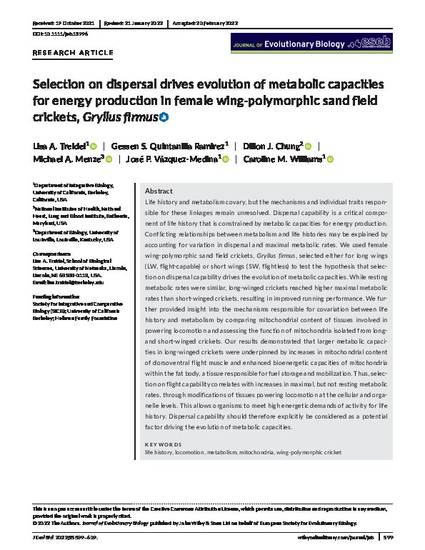
Life history and metabolism covary, but the mechanisms and individual traits responsible for these linkages remain unresolved. Dispersal capability is a critical component of life histories that is constrained by metabolic capacities for energy production. Conflicting relationships between metabolism and life histories may be explained by accounting for variation in dispersal and maximal metabolic rates. We used female wing-polymorphic sand field crickets, Gryllus firmus, selected either for long wings (LW) and flight-capability or short wings (SW) and high early lifetime fecundity to test the hypothesis that selection on dispersal capability drives the evolution of metabolic capacities. While resting metabolic rates were similar, long-winged crickets reached higher maximal metabolic rates than short-winged crickets, resulting in improved running performance. We further provided insight into the mechanisms responsible for covariation between life history and metabolism by comparing mitochondrial content of tissues involved in powering locomotion and assessing function of mitochondria isolated from long- and short-winged crickets. This demonstrated that larger metabolic capacities in long-winged crickets were underpinned by increases in mitochondrial content of dorsoventral flight muscle and enhanced bioenergetic capacities of mitochondria within the fat body, a tissue responsible for fuel storage and mobilization. Thus, selection on flight-capability remodels metabolism in a trait and tissue-specific manner to enlarge metabolic capacities necessary for dispersal.
Treidel, L. A., Quintanilla Ramirez, G. S., Chung, D. J., Menze, M. A., Vázquez-Medina, J. P., & Williams, C. M. (2022). Selection on dispersal drives evolution of metabolic capacities for energy production in female wing-polymorphic sand field crickets, Gryllus firmus. Journal of Evolutionary Biology, 35, 599-609.

This is an open access article under the terms of the Creative Commons Attribution License, which permits use, distribution and reproduction in any medium, provided the original work is properly cited.
© 2022 The Authors.